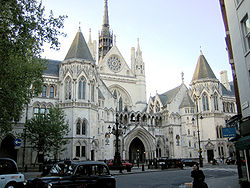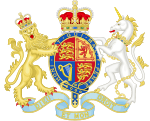- High Court of Justice
-
For other uses, see High Court of Justice (disambiguation).
High Court of Justice 
Royal Courts of Justice, The StrandEstablished 1875 Jurisdiction England and Wales Location Royal Courts of Justice, London Authorized by Her Majesty the Queen via the Supreme Court of Judicature Act 1873 Decisions are appealed to Court of Appeal and Privy Council Website Royal Courts of Justice Lord Chief Justice of England and Wales Currently Lord Judge Since October 2008 The High Court of Justice (usually known simply as the High Court) is, together with the Court of Appeal and the Crown Court, one of the Senior Courts of England and Wales. It is also known as the High Court of England and Wales and abbreviated by EWHC.
The High Court deals at first instance with all high value and high importance cases, and also has a supervisory jurisdiction over all subordinate courts and many (but not all) tribunals.
The High Court is based at the Royal Courts of Justice on The Strand, in central London. It has 'District Registries' all across England and Wales and virtually all proceedings in the High Court may be issued and heard at a district registry. It is headed by the Lord Chief Justice of England and Wales.
The High Court has three main divisions: the Queen's Bench Division, the Chancery Division and the Family Division. The Senior Courts Costs Office, which deals with the quantification of legal costs pursuant to costs orders made by the courts, falls outside these divisions.
Most proceedings in the High Court are held before a single judge, but certain kinds of proceedings, especially in the Queen's Bench Division, are assigned to a Divisional Court (i.e., a bench of two or more judges). Exceptionally the Court may sit with a jury, but in practice normally only in defamation cases or cases against the police. Litigants are normally represented by counsel, but may be represented by lawyers with a right of audience, or in person.
There are conflicting authorities as to whether, and to what extent, the High Court is bound by its own previous decisions. Appeal from the High Court in civil matters normally lies to the Court of Appeal and thence to the Supreme Court; in some cases a "leapfrog" appeal may be made directly to the Supreme Court. In criminal matters appeals from the Queen's Bench Divisional Court are made directly to the Supreme Court.
Contents
Divisions
The High Court is organised into three divisions: the Queen's Bench Division (also known as the Divisional Court), the Chancery Division, and the Family Division.[1]
Queen's Bench Division
Main article: Queen's BenchThis article is part of the series: Courts of England and Wales Law of England and Wales  Administration
Administration- Ministry of Justice
- Her Majesty's Courts and Tribunals Service
- Judges' Council
Civil courts- Supreme Court of the United Kingdom
- Privy Council
- Court of Appeal
- High Court of Justice
- County Courts
Criminal courts- Supreme Court of the United Kingdom
- Court of Appeal
- High Court of Justice
- Crown Court
- Magistrates' Court
- District Judge
- Justice of the Peace/ Lay Magistrates
Criminal prosecutionLegal professionThe Queen's Bench Division — or King's Bench Division when the monarch is male — has two roles. It hears a wide range of contract law and personal injury/general negligence cases, but also has special responsibility as a supervisory court. Until 2005, the head of the QBD was the Lord Chief Justice (currently Lord Judge). A new post of President of the Queen's Bench Division was created under the provisions of the Constitutional Reform Act 2005, leaving the Lord Chief Justice as President of the Courts of England and Wales, Head of the Judiciary of England and Wales and Head of Criminal Justice.[2] Sir Igor Judge became the first person to hold this office in October 2005.[2][3]
High Court Judges also sit in the Crown Court, which is concerned with criminal cases, but High Court Judges only hear the most serious and important cases, with Circuit Judges and Recorders hearing the majority. In addition, the Queen's Bench Divisional Court hears appeals on points of law from the Magistrates' Court[4] and from the Crown Court.[5] These are known as Appeals by way of Case Stated.
The Queen's Bench Division oversees all lesser courts and is the appropriate legal forum where certain government decisions may be challenged on legal grounds. Generally, unless other appeal processes are laid down in law, anyone who wants to challenge the validity of any decision of a lesser court, tribunal, government authority or local authority brings a claim for judicial review in the Administrative Court of the Queen's Bench Division. A single judge first decides whether the matter is fit to bring to the court (to filter out frivolous or unarguable cases) and if so the matter is allowed to go forward to a full judicial review hearing with one or more judges.
Appeals from the High Court in civil matters are made to the Court of Appeal (Civil Division); in criminal matters appeal from the Divisional Court are made only to the Supreme Court of the United Kingdom.
Specialised Courts of the Queen's Bench Division include the Technology and Construction Court, Commercial Court, the Admiralty Court and the Administrative Court.
Chancery Division
See also: Court of ChanceryThe Chancery Division deals with business law, trusts law, probate law, and land law in relation to issues of equity. It has specialist courts (the Patents Court and the Companies Court) which deal with intellectual property and company law matters respectively. All tax appeals are assigned to the Chancery Division. The head of the Chancery Division was known as the Vice-Chancellor until October 2005, when the title was changed by the Constitutional Reform Act 2005 to Chancellor of the High Court. The first Chancellor (and the last Vice-Chancellor) is Sir Andrew Morritt. Cases heard before the Chancery Division are reported in the Chancery Division law reports. In practice, there is some overlap of jurisdiction with the QBD.
Family Division
The Family Division deals with matters such as divorce, children, probate and medical treatment. Its decisions may concern life and death and are perhaps inevitably regarded as controversial. For example, it permitted a hospital to separate conjoined twins without the parents' consent; and allowed one woman to have her life support machines turned off, while not permitting a husband to give his severely disabled wife a lethal injection with her consent. The High Court Family Division has jurisdiction to hear all cases relating to children's welfare and interest, and exercises an exclusive jurisdiction in wardship cases. The head of the Family Division is the President of the Family Division, Sir Nicholas Wall. High Court Judges of the Family Division sit at the Royal Courts of Justice, Strand, London, while District Judges of the Family Division sit at First Avenue House, Holborn, London.
The Family Division is comparatively modern, having been formed by the Judicature Acts by combining the Court of Probate, the Court for Divorce and Matrimonial Causes and the High Court of Admiralty into the then Probate, Divorce and Admiralty Division of the High Court, or Wills, Wives and Wrecks as it was informally called. It was renamed the Family Division when the admiralty and probate courts were transferred to other divisions.
Judges
Main article: High Court judgeThe Justices of Her Majesty's High Court of Justice are informally known as High Court judges, and in judicial matters are formally styled The Hon. Mr(s) Justice (Forename) Surname. Socially they are known simply by the knighthood or damehood which by convention they are given upon appointment, without the prefix "The Hon.". High Court Judges are sometimes referred to as "red judges" after the colour of their formal robes, in contrast to circuit judges who are referred to as "purple judges" for the same reason.
High Court Judges are appointed by the Queen on the recommendation of Judial Appointments Commission, from qualified lawyers. HM Government is statutorily required to respect the principle of judicial independence. High Court Judges may be removed only by a procedure requiring the approval of both Houses of Parliament. In addition to full High Court judges, other persons are authorised to sit as Judges of the High Court, to hear particular types of case; these include certain Circuit Judges and senior Queen's Counsel. Such persons are generally referred to as deputy High Court Judges. Whilst sitting, deputy judges are addressed as though they were full justices.
Much judicial work concerned with procedural or non-contentious matters and certain trials is conducted by junior judges known as "Masters of the High Court" (whether male or female).
See also List of High Court Judges of England and Wales.
Circuits
Historically the ultimate source of all justice in England was the monarch. All judges sit in judgement on the monarch's behalf (hence they have the royal coat of arms displayed behind them) and criminal prosecutions are generally made in the monarch's name. Historically, local magnates administered justice in Manorial Courts and other ways. Inevitably, the justice administered was patchy and appeals were made direct to the King. The King's travelling representatives (whose primary purpose was tax collection) acted on behalf of the king to make the administration of justice more even. The tradition of judges travelling around the country in set 'circuits' remains to this day, where they hear cases in the district registries of the High Court.
External links
Notes and references
- ^ Williams, Smith (2010). p. 6.
- ^ a b "Constitutional Reform Act 2005 (c. 4)". Opsi.gov.uk. 2005-03-24. http://www.opsi.gov.uk/acts/acts2005/50004--c.htm#7. Retrieved 2009-03-13.
- ^ "NDS - News Distribution Service". Gnn.gov.uk. 2008-08-15. http://www.gnn.gov.uk/environment/detail.asp?ReleaseID=171681&NewsAreaID=2&NavigatedFromDepartment=True. Retrieved 2009-03-13.
- ^ See Challenges to decisions of England and Wales Magistrates' Courts.
- ^ See Courts of England and Wales for an explanation of these courts.
- Williams, Glanville Llewellyn; Smith, A. T. H. (27 July 2010). Learning the Law. Sweet & Maxwell. ISBN 978-0-414-04173-8. http://books.google.com/books?id=y1shPwAACAAJ. Retrieved 29 August 2011.
Categories:- Courts of chancery
- High Court of Justice
Wikimedia Foundation. 2010.
